Finding a Solution to Mississippi’s Healthcare Crisis
As Mississippi continues to languish at the bottom of the nation’s health indicators, health providers, health advocates, community and faith leaders have joined together to offer ideas that would begin to address this issue.
To start the conversation, we are putting forth a plan that would provide private health insurance to thousands of our state’s working poor; offer reforms that strengthen and improve the state’s Medicaid program; and grow our state’s tax base while protecting jobs and services at our rural hospitals and community health centers.
Over the summer we will take these ideas to voters across Mississippi. The people of Mississippi want to hear solutions. They want answers as to why their local hospital is closing and why Mississippi remains in last place in health outcomes. Mississippians also want to know why their tax dollars are going to pay for healthcare in Arkansas, Kentucky and other states but not here at home. Those states are cutting their uninsured rates in half while Mississippi remains stuck at the bottom.
To continue this conversation, we are asking state leaders to move past politics and study this issue to consider real solutions for our state’s healthcare woes. The ideas Cover Mississippi will present today are just a starting point. These concepts build off both Republican and Democratic Party ideas. It serves as an example that Mississippians can work together to make sure everyone has access to affordable healthcare.
Security for Working Families
Thousands of cashiers, cooks, construction and truck drivers earn too much to qualify for Mississippi Medicaid but aren’t offered coverage by their employer. Our approach would provide these working adults tax credits to working families that would make health insurance affordable and accessible. Instead of expanding the traditional Medicaid program, Mississippi would use federal Medicaid dollars to provide premium assistance to working families.
Promoting Personal Responsibility
Under our alternative approach, Mississippi would establish a health savings account for working families called the Mississippi Healthy Living Account. Enrollees would make regular contributions to this savings account that would be used for their co-pays and to meet other cost sharing requirements. Cost-sharing will be paid into health accounts and can be reduced through compliance with healthy behaviors. Healthy living accounts and healthy behavior protocols will be developed by the state and submitted to CMS for approval.
Reforming Medicaid/Cutting Waste
A Mississippi solution would NOT add Mississippians to the Medicaid Rolls. It actually cuts the number of Mississippians eligible for Medicaid and strengthen the private insurance market. Our approach would transition low-income parents off of traditional Medicaid by providing new private insurance options. Our proposal would increase reimbursement for primary care providers. And by modernizing the enrollment process, the plan would reduce government waste and diminish opportunities for fraud. Several states, including our neighbors in Alabama, have implemented a data-sharing initiative commonly referred to as “Fast-Track.”
Brings Mississippi Tax Dollars Home
No matter your opinion of the ACA, it is the law. And currently Mississippi is paying for the cost of the law while refusing its benefits. Without this or a similar plan, Mississippi taxpayers will spend $1.8 billion to pay for health care in New York, California and other states.
CLICK HERE TO READ THE PROPOSAL
Church Announcement for National Faith Weekend of Action
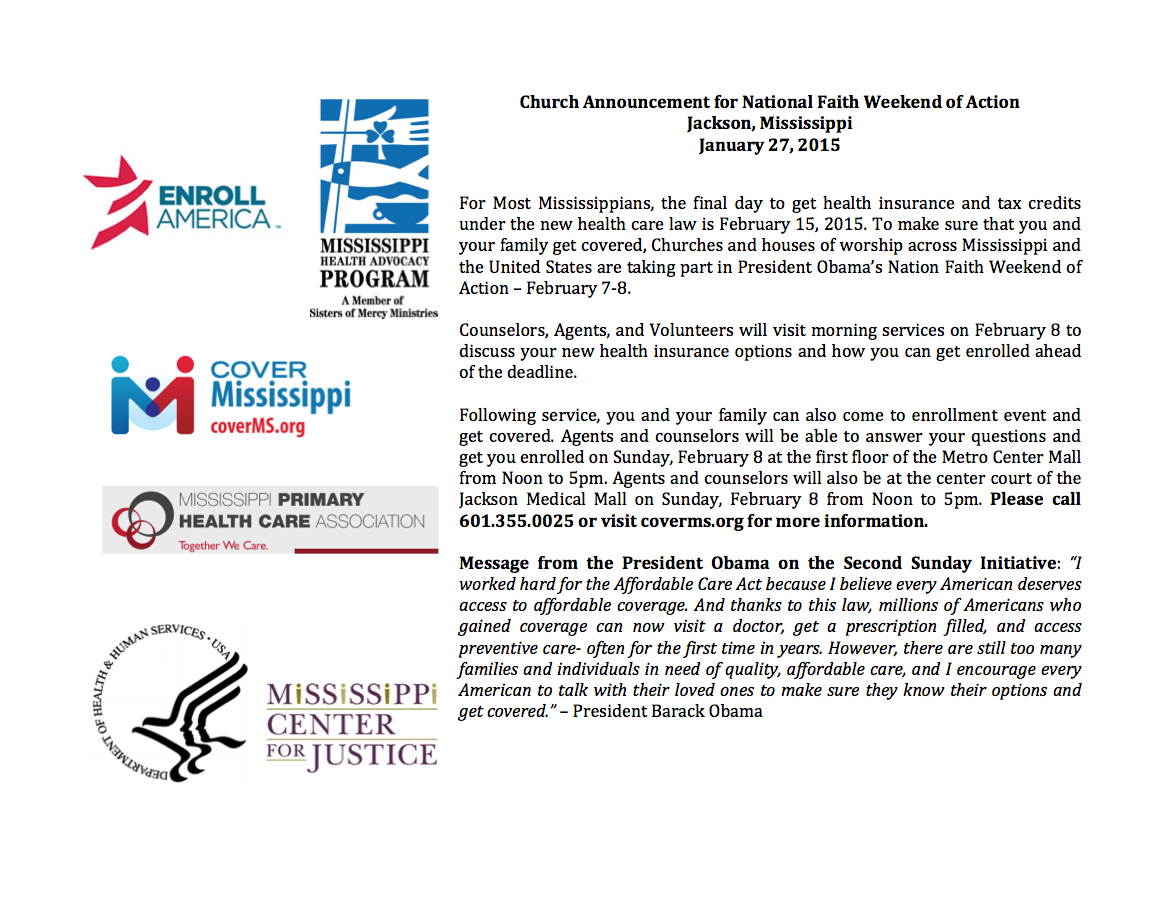
Jackson Planning Meeting on Faith Weekend of Action
My name is Jarvis Dortch and I am an attorney with the Mississippi Health Advocacy Program(MHAP). MHAP is working with the United States Department of Health and Human Services and Enroll America to promote here in Mississippi, President Obama’s National Faith Weekend of Action on Health Care (February 7-8).
Monday’s meeting in Jackson was the first in a series of statewide planning meetings on this initiative. We are asking faith leaders to join with us in promoting enrollment in affordable health insurance offered under the new health care law (ObamaCare).
We left today’s conversation in Jackson with the following plan for February 8:
- Church Visits: Representatives and volunteers will visit Metro Jackson churches on the morning of February 8th. They will be provided 3-5 minutes to speak on the importance of and ways to get covered, promote enrollment events scheduled in the area and address Mississippi’s Medicaid expansion gap.
- Enrollment Events: We will have at least two February 8 enrollment events in the afternoon following morning services
- Metro Center Mall 12 noon - 5pm on February 8th
- Center Court of the Jackson Medical Mall 12 noon - 5pm on February 8th
- Conference Call: We will have a conference call with all participants on February 2, 2015. This call is to go over and finalize plans for the events.
- Call Time: Monday, February 2 at 6pm Call Line: +1 (571) 317-3112 Access Code: 328-262-837
- Please feel free to invite any other faith or community leader to participate in the call and to reach out to me at 601.353.0845 or jdortch@mhap.org.
- Training Meeting: The Mississippi Center for Justice and MHAP will host a training for Pastors and health or social ministry leaders on the new health insurance law, medicaid expansion and discussing health care in the pulpit.
- February 4, 2015- Training with Faith Leaders.
- @ The Mississippi Center for Justice - 5 Old River Place, Jackson, MS 39202
10:30 AM to Noon. Contact to RSVP: Kristian Weatherspoon at 601.355.0025 or kweatherspoon@mhap.org
So we can begin preparing for February 8th please provide us with the following information. You can email me your responses.
- Place of Worship and Address:
- Pastor Name
- Person we should contact at church with their phone number and email:
- Approximate Congregation Size:
- Worship Times on Sunday:
- Bible Study Time on Wednesday:
- Approximate Time During Service We Can Make Announcements:
Best,
Jarvis
Jarvis Dortch, Esq.
Program Manager
Mississippi Health Advocacy Program
Office:601.353.0845
Cell: 601.983.9346
Email: jdortch@mhap.org
Faith Weekend of Action Flyer
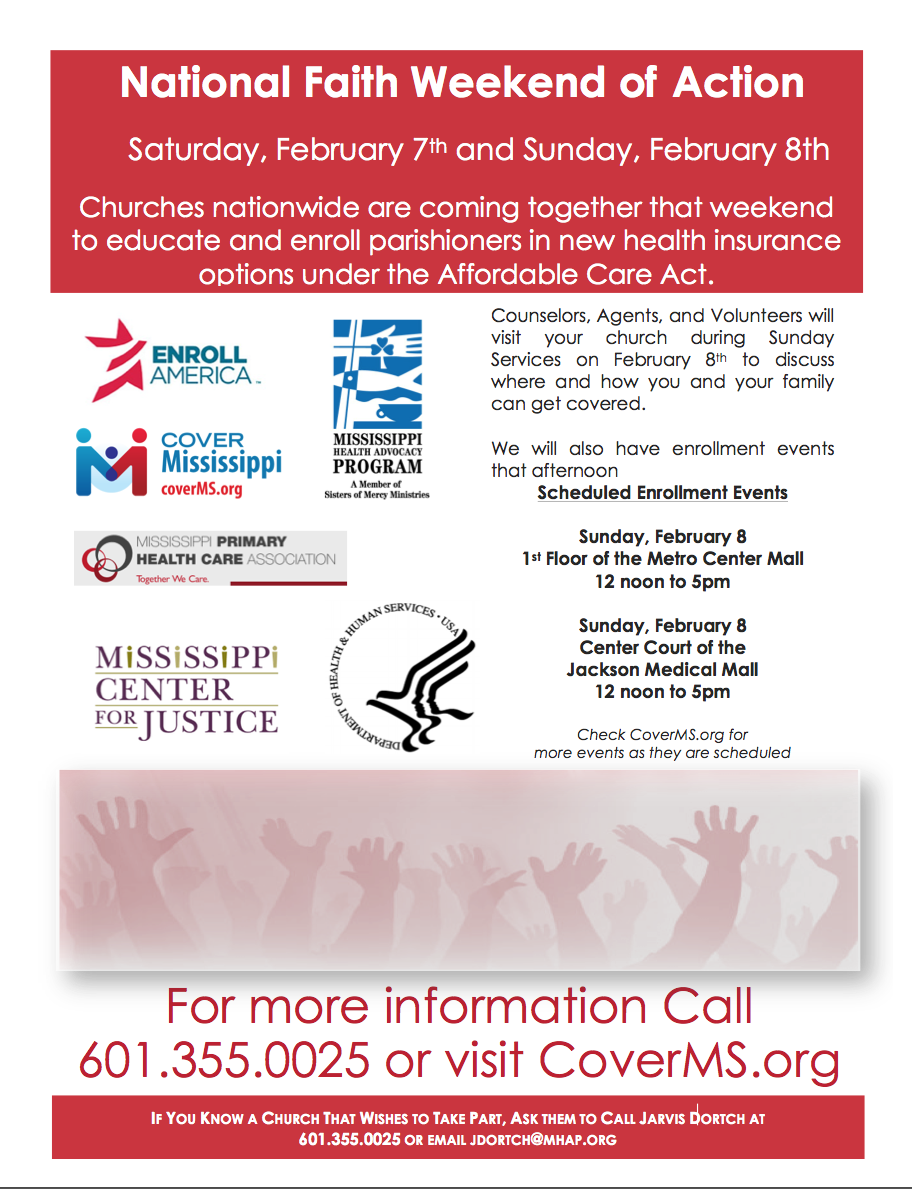
National Faith Weekend of Action Saturday, February 7 and Sunday, February
The United States Department of Health and Human Services, along with Enroll America, has launched a 2nd Sunday Enrollment initiative at faith and community based organizations across the country. Local partners, including the Mississippi Health Advocacy Program, Mississippi Center for Justice, Mississippi Primary Health Care Association, and the Cover Mississippi Coalition, are working with these national groups to support the Faith Weekend of Action (February 7-8).
We have information we can share with your congregations to help Faith Weekend of Action events, such as tip sheets, bulletin inserts, pulpit announcements, press releases to alert the local community that people can get in-person assistance to enroll in a Marketplace health insurance plan that meets their needs.
If your church would like to be involved, please contact us at 601.355.0025
Dr. Aaron Shirley Blog: Nick Dortch
It is a generally known fact that the Affordable Care Act is a new healthcare law that provides Americans with better health security by putting in place comprehensive health insurance reforms that would: expand coverage, hold insurance companies accountable, lower health care costs, and increase the quality of care for all American citizens. The law refers to two independent pieces of legislation that, together would expand Medicaid to millions of low-income Americans and make several improvements to Medicaid. When put in place the act would require Americans to purchase healthcare coverage, but for those who already have insurance coverage and like what they have are able to keep it and are not forced to change their insurance. The law allows individuals and families to be in control of their healthcare and as its title suggests also makes healthcare more affordable for different groups within the middle class by offering the biggest tax cuts for the middle class in American history and millions of families will also benefit form new tax credits that help them reduce their premium costs and buy insurance.
Unfortunately such benefits and others have barely impacted and effected
Mississippi in contrast to others state. The lack of the laws impact is due to
several issues, including the conservative officials and governor of
Mississippi, Phil Bryant, choosing to opt out of the Medicaid expansion in 2012
and overall opposing the act, an overall lack of knowledge regarding the law amongst
a majority of Mississippi’s population, and other errors with the healthcare
site. These problems and others caused the Law which could help Mississippians
so much end up trapping it into and even more severe healthcare crisis.
Nick Dortch
Tougaloo College
Dr. Aaron Shirley Fellowship Blog: Nakiya Beaman
There are thousands of people in Mississippi going without healthcare in a state that houses:
· 20% population that does not graduate from high
school,
· 22% population rate that lives in poverty
· 25% of the population does not have healthcare.
· Some of the highest rates in heart disease,diabetes, obesity
· Highest mortality rate in the nation
· A last-place ranking in mortality rate, per capita income, children’s literacy
The Affordable Care Act offers healthcare to many Americans
that would not have had healthcare otherwise because of its magnanimous costs
and lack of public knowledge about the process. The enforcement of the ACA
allows people to be more active in their healthcare decisions while also
offering a competitive marketplace or insurers so that premiums can be fair and
stable for the insured.
Mississippi is in no shape to ignore the potential in the
Affordable Care Act. It does not only make coverage possible for many who
couldn’t have it before but sparks an important conversation about healthcare in
Mississippi not limited to the effects of this federal law but issues with
state programs such as Medicaid expansion.
Nakiya Beaman
Jackson State University
Dr. Aaron Shirley Fellowship Blog: Jakalah Brown
As a Chicago native I have been expose to progression from an early age.
During the summer before my senior year of college, I began an internship with a health insurance company in my hometown. The progressive energy in that company was definitely infectious.
Every department seemed to be excited about Medicaid expansion and
how it would also positively impact the company. I was submerged in to the
excitement and it was so refreshing to see so much action was being done to
insure the success of Medicaid expansion under the Affordable Care Act. After I
finished my internship, I returned to Mississippi for school and I was met with
completely different circumstances in regard to Medicaid expansion. It is
baffling to me that one of the country’s unhealthiest states is lagging behind
on something that clearly will be beneficial for its citizens. Mississippi
ranks high in life threating health conditions, such as obesity and diabetes,
in comparison to other states, yet Mississippi legislators are not taking
advantage of the new funding that would be available if they expanded Medicaid.
This funding is necessary because it will help to replace federal funding, which is used by hospitals to treat uninsured
patients. Understanding the benefit of the ACA and using it to our advantage
will be the key to prosperity in this country’s healthcare system. Another
important issue to tackle is educating more individuals on Affordable Care Act as
a whole and how it will benefit them. There is so much information being
distribute that it maybe hard for individuals, in Mississippi and in other
states, to decipher between what is actually factual and rumors. The ACA is
such an important piece of legislation and I feel that it its my duty to help
educate others on its meaning.
During the summer before my senior year of college I began an internship with the United Auto Workers/Global Organizing
Institute. I was immediately submerged in to a student led grassroots movement
that seem to be bigger then just getting the Nissan workers in Canton MS
unionized. Faced with opposition at every corner in Canton, we often times
found ourselves feeling defeated, but day after day we would try to reach out
to individuals that were willing to listen. Some would listen and offer advice
on how we could reach others. Although I no longer work with the UAW/GOI, I
appreciate the lessons I learned that summer and as I start a new journey with
the Mississippi Health Advocacy Program I know no how to deal with opposition:
Persistence. The Affordable Care Act’s main purpose is to expand health care
coverage in the United States and the unhealthiest state in the U.S is lagging behind.
Jakalah Brown
Jackson State University
Dr. Aaron Shirley Fellowship Blog: Edna Chukwuemeka
The Affordable Care Act requires all Americans to have health insurance and provides them the affordable opportunity to do so. Through a marketplace consisting of available insurers,those without health insurance, seeking improved coverage or affordability, can shop for the plan best suited to their respective needs. The Affordable Care Act, also widely known asObamaCare, originally mandated that states provide coverage for all adults. However the Supreme Court ruled that while the ACA was constitutionally acceptable the Medicaid expansion required of states was not, and this state expansion requirement was instead made optional. The expansion of Medicaid would bring millions of federal dollars into the state of Mississippi and provide health coverage to those who “over-qualify” for the marketplace yet are unable to afford health insurance.
Mississippi, which notoriously ranks last in many health and fiscal national reports, would be a quintessential benefactor of the expansion of Medicaid. However governor Phil Bryant unapologetically insists on making the issue one of
political ideology rather than what is best for his most poverty-stricken constituents. As if the estimated 280,000 who won’t have insurance don’t exist?
Governor Bryant they do exist and their preventable and unfortunate lack of coverage negatively affects the state in which you swore to serve. Medicaid expansion would not only provide thousands of jobs but net revenue of $848
million between 2014 and 2020.
As a political science
(international studies concentration) and biology student, introductory
discussions of third-world countries frequently offered a lighthearted
reference to Mississippi as our national exemplification-with arguably the
strongest resemblances in GDP and health systems. Being a first generation
American from the developing nation of Nigeria, I balked at such a
reference. While Mississippi is behind
its fellow states it certainly was in no such position. Nigerians can only
dream of the healthcare that exists in Mississippi; let alone the opportunity
of the ACA.
Internally I justified that unfortunately some Nigerian leaders, though aware of the condition of their
citizens, selfishly ignore the poverty stricken. Those leaders that do care
don’t have the resources or political ties to impart the change they
desire. In my growing awareness of the
senseless Mississippi political gridlock, the parallel between the Mississippi
and developing nations seemed ironic. Mississippi is being offered federal
resources to influence change in the lives of hundreds of thousands of
Mississippians and is refusing it. I’ll
let my audience draw the obvious correspondence between governance…
Information/Statistical References: An overview of Health Reform. (2010) Center for Mississippi Health
Policy and Georgia Health Policy Center. & ACCESS: A Special Publication of
the Mississippi Health Advocacy Program (2014)
Chukwuemeka
Millsaps College
Dr. Aaron Shirley Fellowship Blog: Courtney Mangum
“Our governor has not expanded Medicaid”, are the words I heard as I sat in my Public Health and Epidemiology class today. I immediately began to pay more attention as my professor spoke of Obamacare. She began this lecture,discussion rather, by saying, “Prevention is less expensive than treatment”. It was almost like she was talking to the four walls around her. I looked around and realized I was the only one who was intrigued by this side conversation. I thought to myself, “Why aren’t college kids interested in healthcare? This applies to us as well.” As I zoned back into class I heard her mention a couple of republican states that were moving towards Medicaid expansion and I knew exactly where she was going with the remainder of the discussion.
“Our governor does not want to expand Medicaid!” she passionately states, and
finally someone asked for clarity…
The Patient Protection and Affordable Care Act (PPACA), also known as the Affordable Care Act (ACA) or Obamacare, puts patients and consumers back in charge of their health care. This law was put into place to
reduce health care costs, increase access to health insurance, and promote public health and disease prevention. Introducing subsidies, mandates, and insurance exchanges are the building blocks behind making health care insurance more affordable.
States are not required to participate, under penalty of losing their existing Medicaid funding, in Medicaid Expansion according to the National Federation of Independent Business v. Sebelius case.
So, why should Mississippi expand Medicaid?
Let’s take a look at the potential impact of the state’s Medicaid program under the Affordable Care Act.
- There would be approximately 220,000 new Mississippians enrolled in Medicaid, with 83.8% of these individuals being previously uninsured
- Medicaid expansion would increase the Mississippi overall state revenues by $848 million between 2014 and 2020.
- Medicaid expansion would increase employment in Mississippi by approximately 20,000 workers between 2014 and 2020.
(Mississippi Road to Reform www.msroadtoreform.org)
Mississippi is one of the leading states in obesity, which leads to hypertension and diabetes. Under the Affordable Care Act many Mississippians would be able to qualify for health care insurance to afford the medicine for such diseases. This would lead to a healthier community. What if you aren’t at risk for hypertension or diabetes? What other benefits are there?
· Outpatient services (doctor visits or tests done outside of a hospital)
· Emergency services
· Hospital stays
· Pregnancy and baby care
· Mental health and substance abuse services, including behavioral health treatment
· Prescription drugs, including generic and certain brand name drugs
· Rehab and habilitative services, those that help people recover from an accident or injury and those that helppeople with developmental issues.
· Lab tests
· Preventive and wellness services, along with those that help people manage chronic conditions. This includes chiropractic care.
· For children only, dental and vision services
(obamacarefacts.org)
“What will happen when Obama is no longer in office?” a student asked. The
professor’s reply was, “The state is pushing towards revisions to
Obamacare.” Another student asked, “Why is there so much conflict
when this healthcare law is supposed to be for the people?”
Courtney Mangum
Tougaloo College
Dr. Aaron Shirley Fellowship Blog: Courtney Warner - Word Choice
Word choice.Sometimes just a simple word is all that takes to influence a person. For
example, if I use the word house, it might lead a person to think of a
residence where another human being might live. But if I use the word home, it
may evoke feelings of family, security, and love. Both words mean the same, essentially, but
each has its own connotation. The same is for the Affordable Care Act (ACA) and
Obamacare. Although both names are referring to the same federal government
mandate, ACA is the more neutral of the two.
In a state like Mississippi, a red state, where racial tensions remain strong, you are lead to
wonder if the law has flopped here simply because it was passed during
President Barack Obama’s administration and because it is widely known as
OBAMAcare. Would it have been welcomed in the state of Mississippi if it was
mandated during a Republican’s administration? Of the 300,000 people who could
have gained healthcare coverage in Mississippi, are they aware of these issues
that are occurring? Do they know that the state of Mississippi shut down its
own insurance marketplace exchange? Do they know that the state of Mississippi
opted out of expanding Medicaid coverage to those who cannot afford subsidized
private insurance? If you are not educated on the issue, then you will not know
there is an issue. Once again, Mississippi and its residents are left in the
dark.
Courtney Warner
Millsaps College
HOOPIN’ FOR HEALTH: OPEN ENROLLMENT 2 TIPS OFF NOVEMBER 15
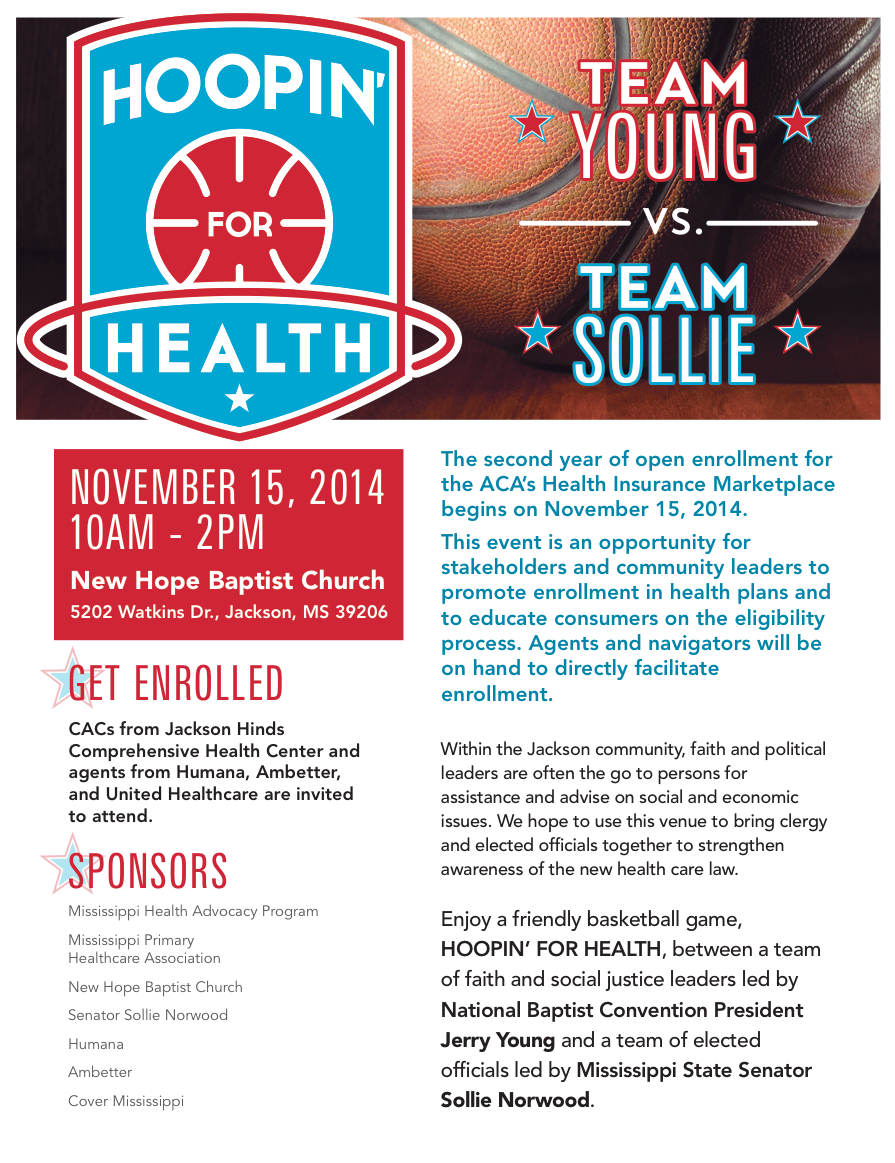
Social Share Images for #MSLEFTMEOUT
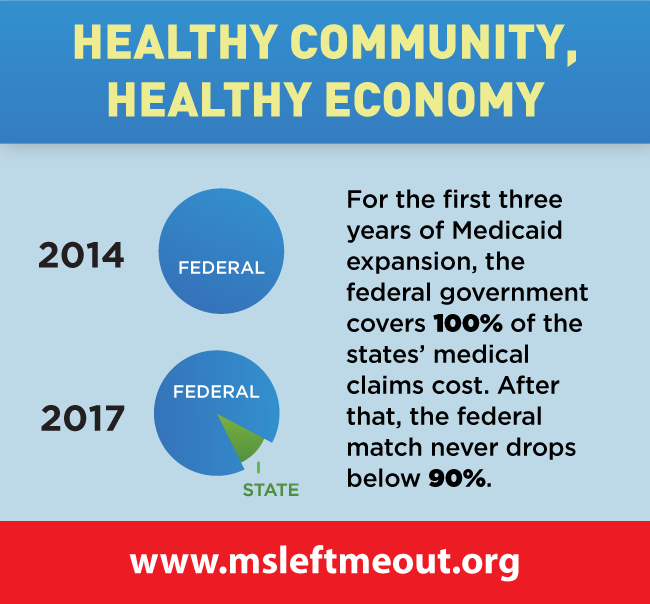
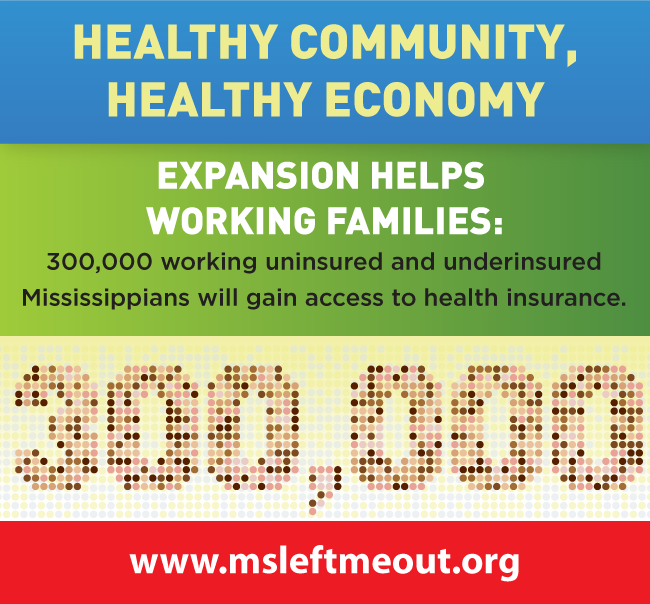
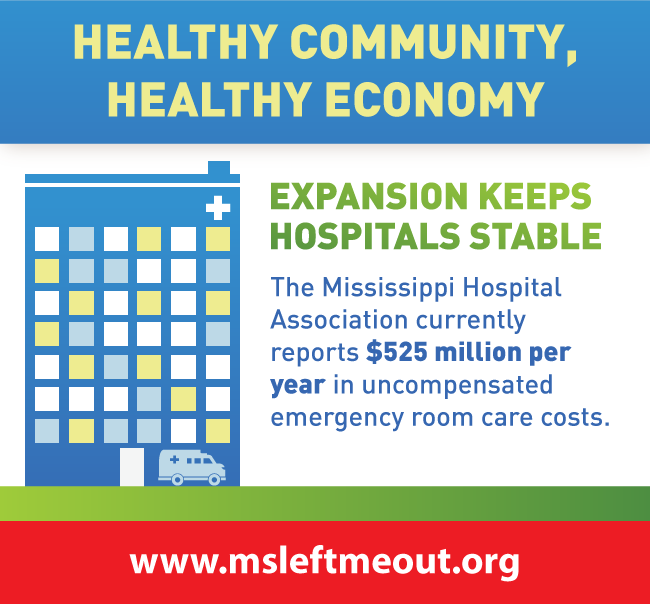
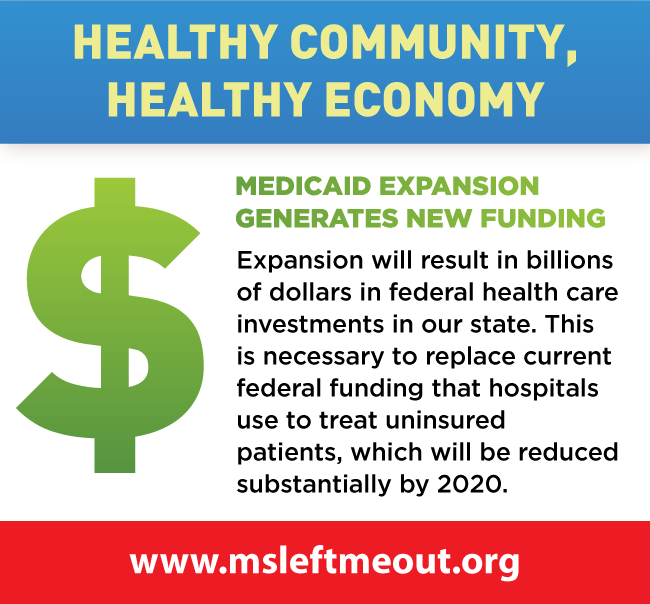
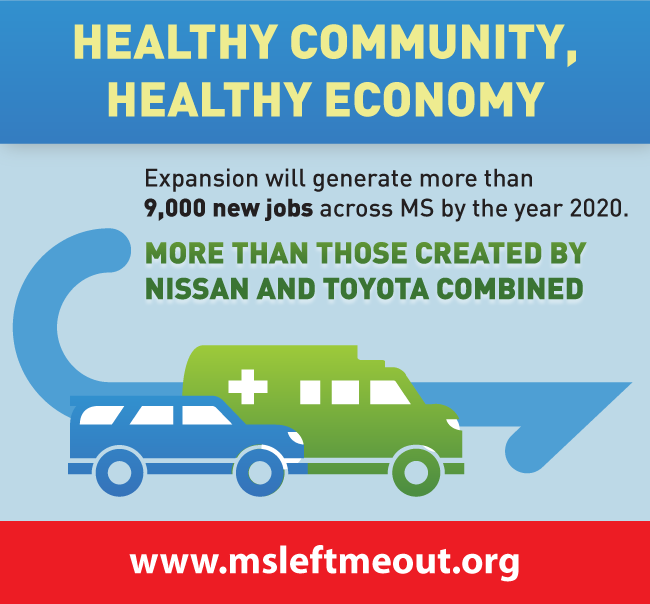
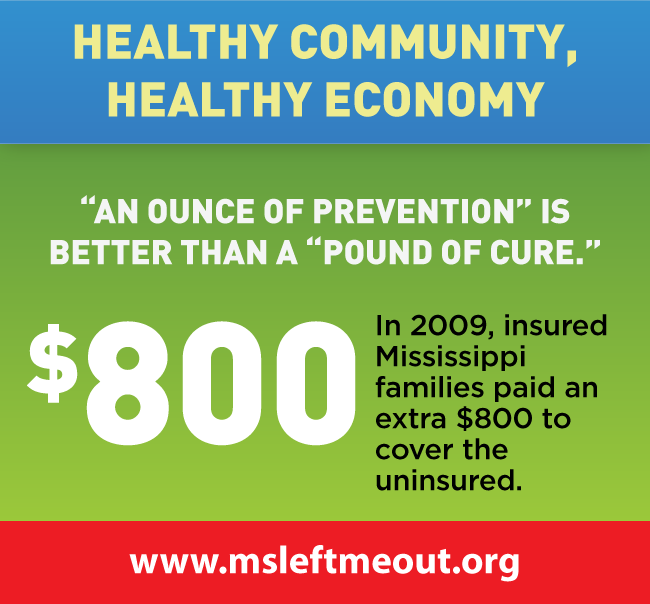
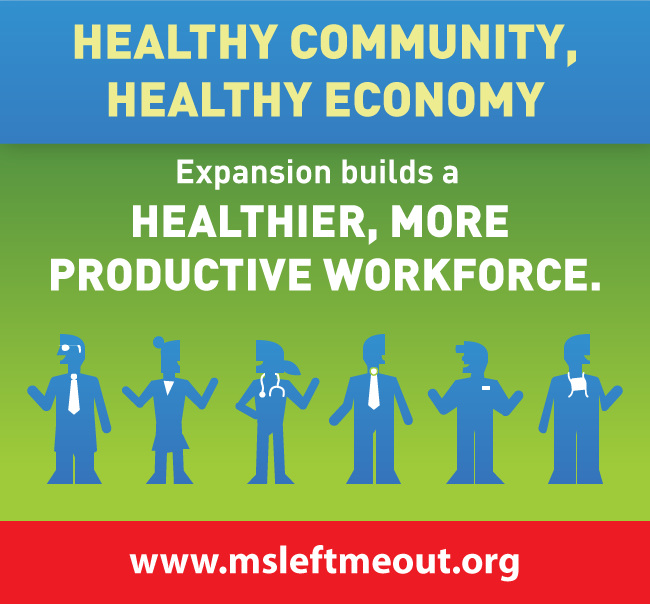
Road to Job Creation
The Economic Benefits to Expanding Medicaid in Mississippi
The Affordable Care Act is Working.
61,000… and Counting THE AFFORDABLE CARE ACT IS WORKING.
The ACA is working for over 61,000 Mississippians who now have health insurance thanks to the new law. It’s working for over 8 million Americans who have purchased private marketplace insurance plans. It’s also working for the 3 million young adults who gained coverage thanks to the ACA by being able to stay on their parent’s health plan. In States that have expanded Medicaid, the ACA is working for another 3 million Americans who now have coverage under Medicaid or CHIP.
Specifically, the new health care law is working for Jackson resident Kimberly Davis. Kimberly was able to find affordable coverage thanks to ACA and is currently paying $40 a month for her medical and dental plan.
“I have MS (multiple sclerosis), I go to the doctor frequently and I really needed health insurance because medications were high, money was tight and medical bills were piling up,” said Davis. “I’m grateful to have (health insurance) because now I can go to my doctors’ appointments and not have to scramble and borrow money to pay for the expensive appointments.”
The ACA is also working for Bobby Lowery of Jackson. Thanks to the ACA, Bobby, who is self-employed, is paying a total of $20 a month for his major medical, dental, and vision plans.
“Health insurance was important because I have a family and kids,” said Lowery. “My plan was $20 a month and that includes dental and I think that’s awesome, I don’t know where you can beat that.”
In Mississippi, over 93% of marketplace consumers are receiving tax credits that help to lower their health care costs. For Mississippians like Kimberly and Bobby, the ACA’s tax credits are working to make health insurance affordable and accessible.
CLICK HERE TO READ THE FULL FINAL ACA ENROLLMENT REPORT
Mississippi Mayors & Elected Officials collaborate for “March to Healthcare Tour”
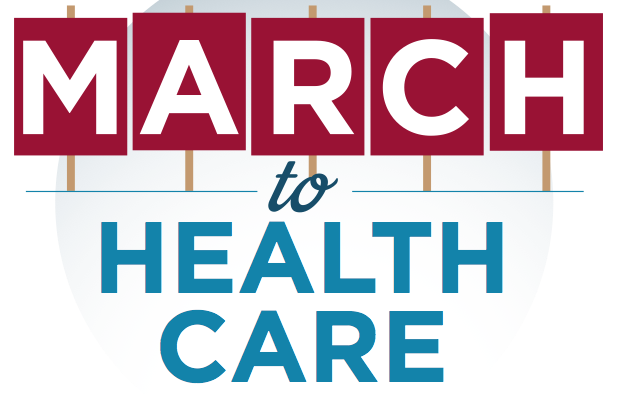
| Hattiesburg March 15 10am-3pm Health Help Mississippi 710 S. 28th Avenue | Greenville March 15 10am-3pm Greenville Weston H.S. 419 East Robertshaw St. | Columbus March 19 3pm-7pm Trotter Convention Center 2nd Avenue North |
| Jackson March 22 10am-3pm Jackson City Hall 219 S. President Street | Gulfport March 22 10am-3pm First Missionary Baptist Church 1100 E. Pass Road | Meridian March 24 10am-6pm Meridian City Hall 601 23rd Avenue |
The Human Factor
With the implementation of the Affordable Care Act, Dr. Aaron Shirley, an advocate for the improvement in healthcare in underprivileged and underserved communities, believes that politics and misconceptions have muddled honest discussion and explanation of the Affordable Care Act, Medicaid expansion and their benefits for many Mississippians.
Shirley started his medical career in Vicksburg, Mississippi following a tumultuous path through segregated schooling in the South. He attended Meharry Medical College in Nashville, Tenn. in 1959 through a scholarship from the Southern Regional Education Plan, a board of Southern governors who attempted to maintain the segregation of their states’ medical schools, by providing stipends for African-Americans to attend medical school out of state.
As stipulated in the scholarship, recipients were required to return to their homes to practice for 5 years in “needy” areas before being allowed to leave and pursue medical careers elsewhere.
Upon his return to Mississippi, Shirley took part in “Freedom Summer” and provided care for freedom riders injured during their trek through Mississippi. After becoming actively involved in the civil rights movement, Shirley decided to abandon plans of leaving Mississippi to remain in the state to practice medicine.
During this time, Shirley and other African-American physicians were denied admitting privileges at area hospitals, nor could African-American physicians practice in certain hospitals in the State. Despite these denials, Shirley’s resolve to pursue admittance and residency to these institutions was strengthened. In 1965, Shirley was the first African-American in the state to be admitted to the University of Mississippi for residency in pediatrics.
“It was during my training that I realized that health care in Mississippi, especially poor children…in a society that on paper and on Sunday morning said it cared, but I realized the way we provided care to poor people just wasn’t adequate, so I dedicated the remainder of my career to trying to correct some of that.”
Shirley’s determination to improve the plight of the poor and underserved has birthed much advancement in the area of health care in the Metro Jackson area. With his guidance, in 1970, the Jackson Hinds Comprehensive Health Center became one of the State’s largest primary care providers for underinsured and underserved populations.
One of Shirley’s hallmark accomplishments is seen in the partnering of the University of Mississippi Medical Center, Tougaloo College and Jackson State University which under Shirley’s leadership, led to the development of the Jackson Medical Mall in 1997. The Medical Mall brought health services and specialized care to a previously blighted property in northwest Jackson to serve a community with less than adequate access to essential health services.
Shirley’s jovial disposition in the discussion of the controversial topic of Medicaid expansion and the Affordable Care Act, tempered with real life experience is a break from the political speak that many have seen as taking over the debate about healthcare in Mississippi.
“The politicians have done a good job painting Medicaid expansion Black,” he says.
With the Affordable Care Act providing viable options for Mississippians with no insurance and offering providers options to provide care to the uninsured, Shirley says his mission with the Jackson Medical Mall is to help Mississippi citizens and politicians alike understand that the impacts of healthcare reform or the lack there of are far reaching, far beyond barriers of race or ethnicity.
As far as the benefits are concerned, Shirley says the ACA is the best answer to the worst problem, access.
“You have people with insurance money but not enough doctors, hospitals and all, then you have people with a type of insurance, where you have doctors that don’t accept it, then you have those who have no insurance and not enough financial resources to purchase the care that they need,” explains Shirley.
He also points out the dangers that providers operating in smaller hospitals face with the possible elimination of Disproportionate Share Hospital (DSH) payments. Especially in rural areas, this elimination could put some hospitals and providers in danger of closure as they lose funding to treat uninsured patients.
For Shirley, it all comes down to what he calls, “the human factor.”
“The relief of complications or illness that adequate coverage would mean,” says Shirley.
This relief is why he says the ACA and Medicaid expansion are perhaps the most pressing and important factors in the economy of Mississippi.
With his decades of fighting and his significant gains in healthcare, Shirley says he still believes that the expansion of Medicaid in Mississippi is inevitable and something that the State must do.
Until such time, he is committed to celebrating the victories while continuing the discourse on the need for adequate access to care. The Jackson Medical Mall is acting as a direct agent for outreach and enrollment in the insurance exchange, they have sponsored listening sessions concerning the ACA and will continue educating Mississippians on health reform.
Shirley says that his work in this field is far from done, “Personally I will be looking for every opportunity to try and convince people that they should think twice before allowing folks to cause them to oppose policies that could benefit them.”
